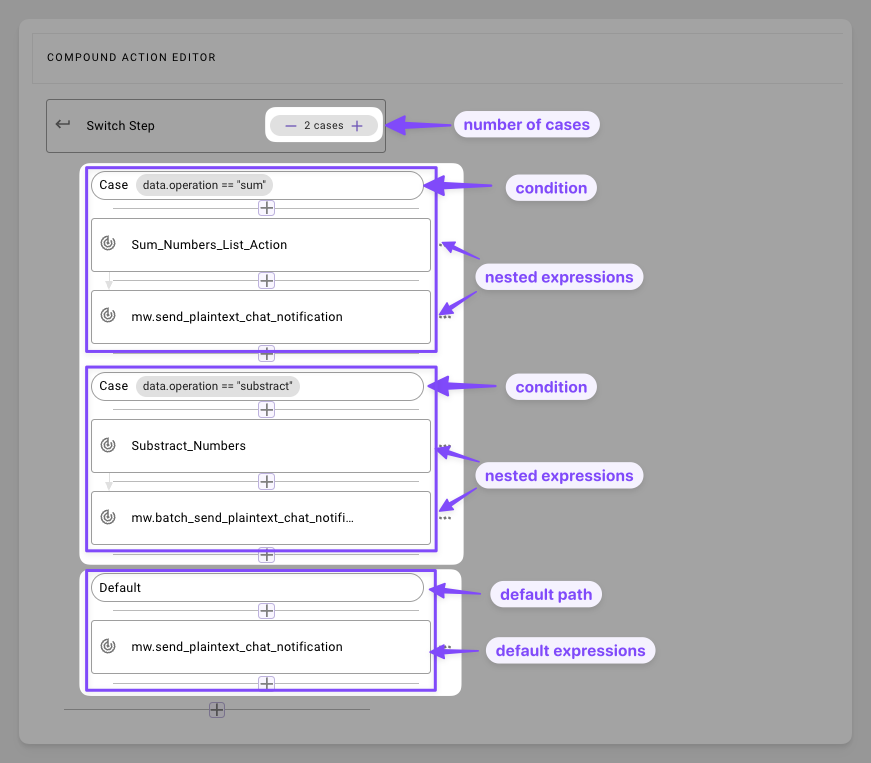Switch
Overview
The switch expression is a control flow expression that evaluates a list of boolean conditions in order. The first true condition executes its steps; if none match, it runs the optional default. Each case pairs a condition with a list of expressions; empty steps allow silent passes.
Low-Code Editor
Add a switch step, define DSL conditions per case and add expressions inside each case.

- Define the Number of Cases: Click on the "+" or "-" symbol to add or remove cases.
- Define Condition in a Case: Select a case block; enter a boolean DSL expression in the editor (e.g.,
data.operation == "sum")' - Add Steps in the Case: Click "+" inside the case to add expressions.
- Configure the Default: Add fallback steps. Omit for silent skips on no-match.
Syntax Reference
Schema
switch:
cases: # list: Sequence of condition-step pairs (required)
- condition: DSL_BOOLEAN_EXPR # boolean: DSL expr (e.g., "data.user_id == meta_info.user.id")
steps: # list: Nested expressions (e.g., actions)
- EXPRESSION_1
- EXPRESSION_2
- condition: ANOTHER_EXPR
steps:
- EXPRESSION_3
default: # dict: Fallback if no cases match (optional)
steps: # list: Default expressions
- EXPRESSION_4Fields
| Field | Type | Mandatory | Description |
|---|---|---|---|
cases | list[dict] | Yes | Sequential checks: First true runs its steps |
condition | boolean | Per case | DSL expressions |
steps | list[expr] | No | List of expressions to execute. Can be empty [] |
default.steps | list[expr] | No | Catch-all list of expressions. |
Practical Examples
Example 1: Simple ID Match
Notify only if the user is not the requestor
switch:
cases:
- condition: meta_info.user.id == data.requestor.record_id
steps: [] # Skip if self-add
default:
steps:
- action:
action_name: mw.send_plaintext_chat_notification
output_key: notification_sent
input_args:
user_record_id: data.user.record_id
message:
RENDER():
template:"Hey {{user_name}}, {{requestor_name}} added you to a special group"
args:
user_name: meta_info.user.full_name
requestor_name: data.requestor.full_nameExpectation: If there's a match, stay silent; If not, send a message to the user
Example 2: Role-Based Welcomes
Tailor onboarding by access level.
switch:
cases:
- condition: data.user.access_level == "admin"
steps:
- action:
action_name: send_admin_welcome
output_key: admin_msg
input_args:
user_id: data.user.id
message: '''Welcome, Admin! Full dashboard access unlocked.'''
- condition: data.user.access_level == "member"
steps:
- action:
action_name: send_member_welcome
output_key: member_msg
input_args:
user_id: data.user.id
message: '''Welcome, Member! Dive into your profile perks.'''
default:
steps:
- action:
action_name: send_generic_access_notification
output_key: generic_msg
input_args:
user_id: data.user.id
message: '''Account ready—start exploring!'''Expectation: Routes to specific action and welcome message based on user's access level.
Example 3: Temperature Thresholds
Alert or log based on sensor data
switch:
cases:
- condition: data.temperature <= 5
steps:
- action:
action_name: alert_cold_temperature
output_key: cold_alert
input_args:
message: '''Alert: Very cold—check heating!'''
- condition: data.temperature > 5 AND data.temperature <= 25
steps:
- action:
action_name: log_moderate_temperature
output_key: mod_log
input_args:
message: '''Moderate temp: All good.'''
default: # >25 implied
steps:
- action:
action_name: alert_high_temperature
output_key: high_alert
input_args:
message: '''Alert: High temp—activate cooling!'''Expectation: Based on the temperature send an alert or log.
Updated 5 months ago